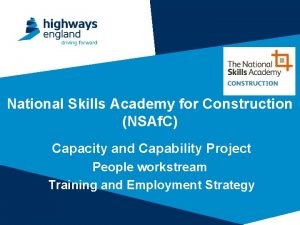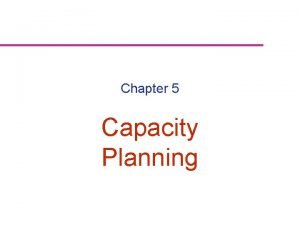National Skills Academy for Construction NSAf C Capacity









- Slides: 9

National Skills Academy for Construction (NSAf. C) Capacity and Capability Project People workstream Training and Employment Strategy

NSAf. C Background • Introduced by Government in 2004, the National Skills Academies are employer led structures to enable increased training and upskilling • One of the first National Skills Academies, the National Skills Academy for Construction (NSAf. C) is now part of a network of 19 Academies covering a range of sectors (i. e. Nuclear, Hospitality, Health, Social Care, Retail, Enterprise etc) • The National Skills Academy for Construction is not a PHYSICAL ENTITY, it is a framework which allows employers to maximise and promote the employment and skills interventions on projects • The NSAf. C Client based approach (CBA) provides a toolkit to deliver employment, apprenticeships and training for Clients through procurement. • Two NSAf. C models are available: • Client based approach (CBA) • Project based approach (PBA)

Blueprint for Transformation As part of Blueprint for Transformation commitments NSAf. C were established under project based approach model by DP’s on MM Schemes and delivered

Blueprint for Continuity document was produced by the DP’s at the end of the MM framework to highlight the achievements and recommended NSAf. C Client based approach model by the DP’s going forward

Making it Highways England Specific Benchmarks set against a variety of contract value bands across the following project types • Project Types • SMP • CIP • Bypass • Widening • Junctions • Highways maintenance • Structural maintenance • Highways routine cyclical maintenance, routine structures Benchmarks (high-level): 1. Work placements (In Education) 2. Work placements (Not in Education) 3. Apprenticeships 4. Jobs created on construction projects 5. Careers Information, Advice & Guidance (CCIAG) 6. Waged Training Weeks on Site 7. Qualifying the Workforce 8. Training plans 9. Case studies Approved Employment and Skills Plans along with associated method statements are developed in line with the benchmarks and form part of the award process & contract documentation

People Solutions – where does NSAf. C Fit ? Promotion & Attraction Recruitment & Retention Training & Assurance National • • Resource Attraction Demand Campaign Model • Apprentice Contractual Obligations • National Skills Academies Diversity • • Make best Recruitment & use of Retention existing Strategies resources • National Skills Academies • Roads Academy National • • Plan for additional Skills future Academies resources • Improve working practices and environment • • Highways Sector Recruitment & Training Organisation Diversity Recruitment & Retention Strategies • Regional Training Centres • Highways Sector Recruitment & Training Organisation Provides a toolkit to deliver employment, apprenticeships and training for public sector clients through procurement of their construction projects. The 14 employment and skills areas include: • • • Work experience NVQs Curriculum support activities Employment Graduates Supervisor training Apprentices Leadership training Subcontract Training Plans Advanced health and safety

Benefits § § § § § Highways England develop, specific, manage and control KPIs type and threshold levels Targets and KPIs are ratified and endorsed by CITB Encourages & supports skills & training throughout the whole supply chain Drives sustainability, consistency and standardisation of employment & skills requirements across all Highways England projects (…programme level standards and monitoring) Applicable to projects of all sizes and types Economies of scale can be achieved; multiple & small projects can be awarded a skills academy status under one agreement – and managed by one central Highways England team Will include an Employment Skills Plan (ESP) in the tender documents and award criteria – Supply chain will be required to commit to the benchmarks / KPIs Allows HE committed apprenticeship targets to delivered under a more inclusive and rounded set of employment & skills requirements. Project compliance, programme consistency & issues managed by HE Employment Skills Manager (ESM) Funding for supply chain training is still available through the CITB grant scheme for contractors


§ NSAf. C CBA model – Endorsed by David Poole and will be the sponsor – Presentation to HE Exec Board in Nov 2016 for approval – IDC approval expected in Dec 2016 § Implementation Strategy – Rollout expected Q 1 2017 through contract T&C’s, enforce the targets to the Supply Chain § Big Message – Largest UK programme and multi-site level NSAf. C implementation in Construction and Highways Sector • NSAf. C will increase Building the Capacity & Capability within the Highway sector by » Introducing and bringing new people to the industry » Up skilled existing workforce » Push the boundaries on best practice
 National skills academy for retail
National skills academy for retail Design capacity and effective capacity examples
Design capacity and effective capacity examples Workface career academy
Workface career academy Construction skills village
Construction skills village National academy for public administration
National academy for public administration National academy of statistical administration
National academy of statistical administration Railroad training school
Railroad training school National emergency services academy
National emergency services academy National coalition academy
National coalition academy National academy of sciences forensic science
National academy of sciences forensic science
















